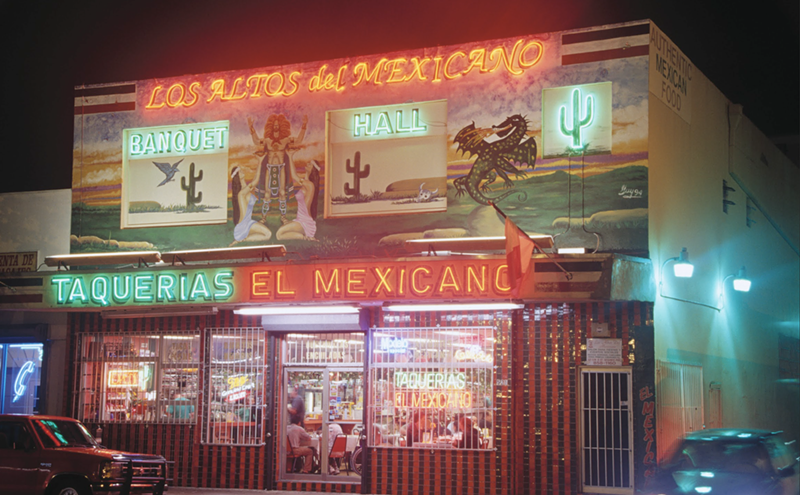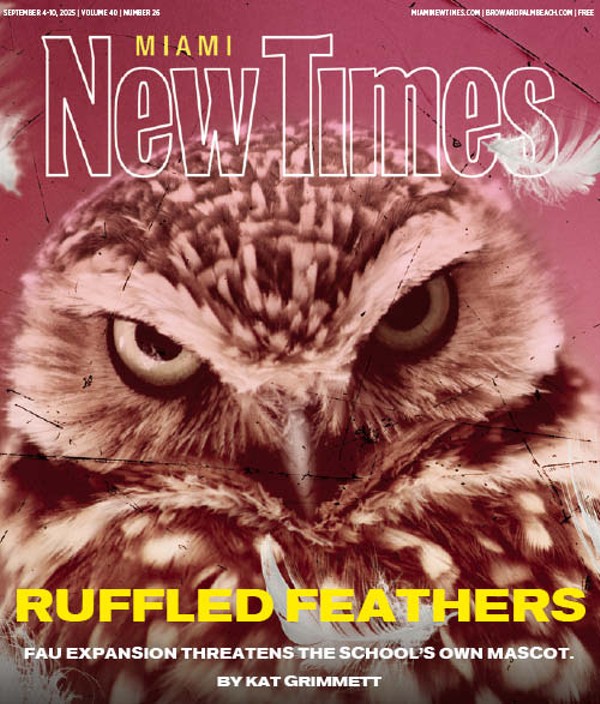"This is a great moment for the Cinema Industry of Brazil," says festival director Claudia Dutra. And she is right, if what is in store in Miami Beach is any indication. "Brazil is making incredible films," Dutra adds, "and there is a growing demand and interest from the public and industry to find out more about Brazilian movies. Five feature films out of fourteen have not been shown to the public -- not even in Brazil. They are about to premiere there as well, which means that the festival's audience this year will have the pleasure to be the first ones to watch these movies in the world."
Bruno Barreto, veteran Brazilian director, points out: "It makes all the sense in the world to hold a Brazilian film festival in Miami." If not here, where? Still, this year's edition is quite a treat by any standards. Call it vision, or chalk it up to luck. But the truth is very few movies anywhere promise the sheer joy and surprise of A Dona da Historia, and it is hardly alone in this festival. Every nation has its day when it comes to filmmaking, it seems, with golden ages happening like miracles once in, say, Italy, then in Sweden, in France, in Hollywood. Here is a sampling of what's up on the Beach, suggesting that the time for Brazilian film is now.
A DONA DA HISTORIA / THE OWNER OF THE STORY (2004):
The life we end up living, the late Michel Foucault once noted, is just one among many possibilities. What if we could choose from the others? What if we could, even for an instant, see what might have been? These questions are at the heart of Daniel Filho's A Dona da Historia, which shuttles the audience back and forth over decades of a couple's relationship and dares to stop time, to savor each moment in the growth of their love. Much can be noted about this movie, but the main thing is this: A Dona da Historia is one of the most beautiful films to come along, from anywhere, in a very long time. Based on a best seller by João Falcão, Filho's film boasts a stellar cast that includes Rodrigo Santoro, perhaps best known to Miami audiences as the heartthrob lead of the Telemundo soap opera Mujeres Apasionadas (Hot Women), shining here opposite the beautiful Deborah Falabella as the love of his life. The same characters, 32 years later, are played with heartbreaking aplomb by Marieta Severo and Antonio Fagundes, two of Brazil's leading actors. What happens to them is told in packed sensual, privileged moments that capture time with Proustian intensity: a student protest drenched in youthful dreams played out against a gentle bossa nova rhythm; dry marital arguments eavesdropped with a clarity worthy of Ingmar Bergman; political frissons subtly conveyed in contrasting Brazilian and Cuban sounds; the ineffable heat of love and lust at first sight remembered alongside the profoundest affection of a marriage that has lasted a lifetime. "You talk just like the movies," our heroine tells her lover. "It sounds so real." This is the sort of movie that actually embodies that reality. A Dona da Historia is billed as a romantic comedy, but it is more than such. It belongs with the exquisite few pictures that at once transcend and celebrate that elusive genre, from the best of Jacques Demy to Stanley Donen and Frederic Raphael's immortal Two for the Road -- another movie that packs an entire era into mere snapshots of a couple's life. If there is one shining example of the maturity, brilliance, and originality of Brazilian film today, this is it. Why mince words? Daniel Filho has given us a masterpiece.
CONTRA TODOS / UP AGAINST THEM ALL (2004):
The beginning is deceptive, even sweet: a laid-back dinner party in a modest eat-in kitchen, with the host piously saying grace before the credits roll onscreen. What follows is something else. Contra Todos turns ugly fast, developing into a gripping snapshot of life in the sleazy lower slopes of the smalltime criminal element. Infidelities and the minor betrayals of adult life morph with unsettling ease from domesticity to the cultlike horrors of an Evangelical Christian sect -- as scary a development in South America as here up North -- and eventually to a bloodbath of Jacobean proportions. This sordid tale about a woman trapped in a bad marriage to a Bible-thumping, child-abusing killer boasts Leona Cavalli and Ailton Graça as the unlikely couple, Silvia Lourenco as their precocious daughter, and a splendid ensemble cast. With a shopping mall that could be anywhere, but with a backdrop that could only be São Paulo today, this intense little picture written and directed by Roberto Moreira is typical of the frantic neorealism that marks so many new Brazilian films. Only the epilogue, where the narrative style changes abruptly, rings false in this otherwise fascinating urban legend.
ODIABO A QUATRO/ FOUR FOR NONE (2004):
Alice de Andrade's positively amoral comedy may well prove to be one of the festival's most endearing discoveries. An unlikely foursome is at the heart of this unusual caper: a lost but definitely spunky little boy who loves a poor nanny-turned-hooker who has an obsession for a rich babe who himself has a thing for exotic dancers; then there's the nanny's pimp. All of this plus a hilariously smarmy television host, some pathetic criminals, the noise and excitement of a senatorial campaign, a lot of sex, vibrant music, and action that breezes from the Copacabana and bustling Rio to the deep Brazilian countryside of Minas Gerais. Don't miss it.
FEMINICES (2004):
How do you say chick flick in Portuguese? This takes some explaining actually. Imagine that, back in 1993, a group of Brazilian actresses had a surprise stage hit with their Confessions of Thirty-Somethings, a reality-based confessional play that ended up running in Rio for five years. Ten years later the cast assembles once more, for a glimpse at the life of the now fortysomething actresses. The whole affair of course is written and directed by Domingos Oliveras in what he calls a "quasi-documentary" shot on video, pretty much Sundance-ready, with an artsy blend of color and black and white. The artificiality of Feminices takes away little of its queasy, surprising impact. The women's stories ring true, you see. Priscilla Rozenbaum, Didina Bernardelli, Clarice Niskier, and Caca Murthe all turn in performances that belie just how precious the movie's conceit is.
ODIQUE? / WHAT'S UP? (2004):
The story is simple: Three ridiculously good-looking lowlife buddies from Rio need cash to get to Bahia for carnival, so they go on an unlikely crime spree. It would be easy to dismiss Felipe Joffily's gritty and explosive picture, written by Gustavo Moretzsohn, as just the latest in a long line of Quentin Tarantino's illegitimate offspring. But there is more going on here. True, the decorative violence, the intense chatter about nonsense indulged in simply for the sound of it, the shallow nihilism spouted by a hot cast, the interminable what-do-we-do-now scenes in the heat of a crime -- stylistic quirks all too familiar from everything from Reservoir Dogs and Pulp Fiction right through both installments of Kill Bill -- are all present and up front in Odique? Also it must be noted that the subtitles attempting to translate Rio street slang into a sort of Ebonics 101 does get a bit irritating. And yet also here is Marcelo Brasil's daring use of the camera as an implacable, immovable witness that would have made Marguerite Duras proud: Characters often move in and out of a shot and hint that life truly is elsewhere. There is a real sense of danger in the drug deals, despite the humor, as well as a sexual tension among the sexually competitive trio of straight boys gone wild. There is Joffily's use of music, from Debussy to hip-hop, that sounds just right but never upstages the action. There is, in other words, real artistry here. Bolstering Joffily's sensitive direction are irresistible performances by Alexandre Moretzsohn, Dudu Azevedo, Leonardo Carvalho, and especially Caua Reymond, a familiar face from the international modeling circuit making a spectacularly smooth transition to big-screen stardom. Odique? -- though not quite on the same level as A Dona da Historia -- is one of the festival's strongest and most winning entries.
MEU TIO MATOU UM CARA / MY UNCLE KILLED A GUY (2004):
This is one cool movie. The setup is a hoot: A favorite uncle drops in at dinnertime and announces "I just killed a guy." What follows is madness, nicely observed from a very bright teenager's point of view. Duca, a computer addict as well as born sleuth with an active fantasy life, imagines his video games might hold the key to solving a crime. He also knows that although his uncle might not be the brightest member of the family, he is probably no killer. What makes Jorge Furtado's picture stand out is that the director never dumbs down Duca's perspective, he never betrays the boy's reality, and he creates a touching and funny portrait of a difficult age that will delight audiences of all ages. Alex Sernambi's cinematography and Furtado's masterly directorial hand add up to a feat of positively exuberant filmmaking. The relaxed and natural multiracial casting, the sensuous use of music by the great Caetano Veloso and Andre Morães, and above all the performances by Darlan Cunha as Duca and by Sophia Reiss and Renan Gioelli as his best friends make for a tender, clever picture.








